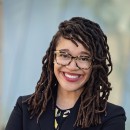Faculty News
Pages
 Karla Goldman Examines the Culture of Silence in Reform Judaism
Karla Goldman Examines the Culture of Silence in Reform JudaismProfessor Karla Goldman’s op-ed in Lilth asks what can be expected from Reform Judaism in the wake of reports of sexual discrimination released by the Hebrew Union College-Jewish Institute of Religion (HUC) in Cincinnati. Goldman shares her own personal history as the first tenure-track woman faculty member on the HUC’s Cincinnati campus, and describes her lawsuit against HUC for wrongful dismissal based on gender bias.
“As a historian of women in Reform Judaism, I have studied Reform’s very real commitment to women’s advancement within Judaism together with its century-long pattern of combining strong rhetoric on female equality with a reality of subordination and exclusion,” writes Goldman. “I knew this culture and its silencing all too well.”
https://lilith.org/articles/after-the-fall-retelling-the-story-of-reform-judaism/
- June 17, 2022
 Stacy Peterson Receives the 2022 Distinguished Lecturer Award
Stacy Peterson Receives the 2022 Distinguished Lecturer AwardField Faculty and Lecturer Stacy Peterson has received the 2022 Distinguished Lecturer Award. For more than twenty years, her exceptional dedication and commitment to social work values have made a positive impact on both students and the field. Peterson has presented at multiple national Council on Social Work Education conferences on innovative field practices.
"Thank you for this wonderful recognition of my work. It is an honor and privilege to be in the company of great leaders and teachers. I am passionate about my work and use the core values of social work (service, social justice, dignity and worth of the person, importance of human relationships, integrity and competence) as a compass in my teaching and serving. I appreciate this acknowledgment and in these tumultuous times, I remain inspired and hopeful that we can contribute to healing our world."
- May 26, 2022
 Ashley Cureton is the 2022 Student Union Teacher of the Year
Ashley Cureton is the 2022 Student Union Teacher of the YearAssistant Professor Ashley Cureton has been named 2022 Student Union Teacher of the Year. This award is given by the School of Social Work students and recognizes faculty who have demonstrated commitment to improving DEI, made an outstanding and positive contribution to the School’s climate, and whose skills, dedication, understanding and caring have made a positive impact on students.
"I find teaching to be a profoundly rewarding experience. In fact, I believe I have the best job on the planet (SSW students are the best!). With the philosophy that education functions as a practice of freedom (as the late bell hooks said), I embrace a progressive, holistic, co-learning and engaged pedagogy with the adoption of cultural diversity in the classroom context. Freedom in education allows me to embrace the performative acts associated with teaching, offer a space for change, invention, and spontaneous shifts and serve as a catalyst to draw out thoughtful and critical discussions among students."
- May 26, 2022
 Daphne Watkins Receives 2022 Distinguished Faculty Award
Daphne Watkins Receives 2022 Distinguished Faculty AwardProfessor Daphne Watkins has received the 2022 Distinguished Faculty Award. Watkins is a University Diversity and Social Transformation Professor who studies behavioral interventions for historically marginalized groups, mixed methods approaches to research in context, and leadership development and organizational structures. She is the Director of the Vivian A. and James L. Curtis School of Social Work Center for Health Equity and Research Training.
"The SSW Distinguished Faculty Award means a lot to me. As someone trained in anthropology and public health, this acknowledgment speaks to the respect my colleagues have for the interdisciplinary nature of my work and what I bring to the School. Social work has been my home for well over a decade, but not without some uncertainty on my part. Early in my career, I wondered if I could truly embody social work’s values in my research, teaching and service. This award confirms I am not only working hard to represent the School in a positive light globally and domestically but that the faculty see me, respect my efforts and are proud to have me as a colleague.”
- May 26, 2022
- Faculty Promotions
Congratulations to the following faculty members whose promotions were approved by the U-M Board of Regents last night: Jaclynn Hawkins, Shanna Kattari and Addie Weaver were promoted to associate professor with tenure. Shawna Lee, Matt Smith and Karen Staller were promoted to professor. Earlier this spring, Rick Barinbaum and Daphne Brydon were promoted to Lecturer II and Yatesha Robinson to Lecturer IV.
- May 20, 2022
- Learn more »
- 2022 School of Social Work Innovations Award Recipients
The inaugural Innovation in Research and Teaching Award recognizes research — with either incremental innovation that builds over time, with its impact to be felt in the future, radical Innovations that current issues in the moment they occur and disruptive innovation that challenges the status quo — or existing theories, methods, and pedagogies.
- May 6, 2022
 Katrina Ellis Named Inaugural Rogel Scholar in Cancer Health Equity
Katrina Ellis Named Inaugural Rogel Scholar in Cancer Health EquityAssistant Professor Katrina Ellis has been named an inaugural Rogel Scholar in Cancer Health Equity. The award recognizes exceptional faculty dedicated to achieving impact on cancer prevention, patient outcomes and quality of life.
“It's truly an honor to be selected as an inaugural Rogel Scholar in Cancer Health Equity. I am very passionate about improving the support we provide to families after a cancer diagnosis as part of larger efforts to address the disproportionate burden of cancer we see among certain racial and ethnic groups in the United States. This award provides valuable support for my ongoing work in this area, particularly projects that will work in a participatory manner with African Americans families to better understand and address their cancer-related health needs while building on the strengths and resources that already exist within these family systems.” said Ellis.
- May 3, 2022
- Learn more »
 Daicia Price Recognized by WCC Foundation Women's Council
Daicia Price Recognized by WCC Foundation Women's CouncilThe work and achievements of Clinical Assistant Professor Daicia Price will be recognized at the 2022 WCC Foundation Women's Council Celebration of Women's Leadership—a virtual event on Wednesday, May 25 at 5 PM. The award honors women who have made significant contributions to the Washtenaw County community.
- May 2, 2022
- Learn more »
 Trina Shanks, Editor on Latest Edition of the Grand Challenges for Social Work and Society
Trina Shanks, Editor on Latest Edition of the Grand Challenges for Social Work and SocietyProfessor Trina Shanks is an editor on the latest edition of the Grand Challenges for Social Work and Society. This second edition outlines bold innovation and collective action powered by proven and evolving scientific interventions to address critical social issues facing society. The chapters tackle problems such as homelessness, social isolation, mass incarceration, family violence and economic inequality.
- April 28, 2022
- Learn more »
 Andy Grogan-Kaylor’s Corporal Punishment Research Cited in the Guardian
Andy Grogan-Kaylor’s Corporal Punishment Research Cited in the GuardianProfessor Andy Grogan-Kaylor’s corporal punishment research was cited in the Guardian. Wales and Scotland have recently banned hitting, smacking and slapping children – and the children’s commissioner for England wants to introduce the same ban in England.
The 2016 meta-analysis of more than 160,000 children found that hitting as a form of discipline is ineffective at positively changing a child’s behavior, in the short and the long term. The analysis also found that children who were disciplined with physical punishment were more likely to become aggressive, display antisocial behavior and exhibit mental health problems.
- April 28, 2022
- Learn more »